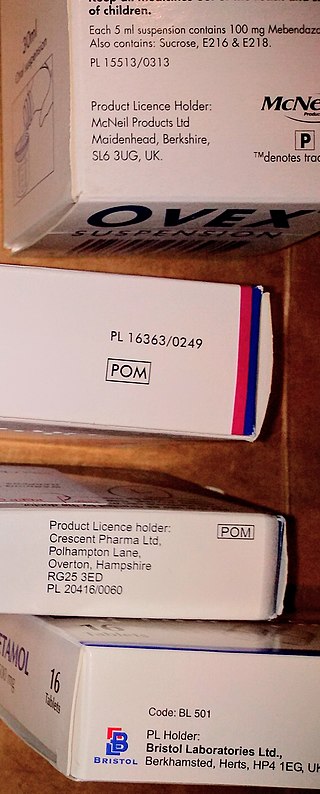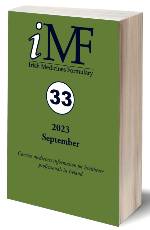
The British National Formulary (BNF) is a United Kingdom (UK) pharmaceutical reference book that contains a wide spectrum of information and advice on prescribing and pharmacology, along with specific facts and details about many medicines available on the UK National Health Service (NHS). Information within the BNF includes indication(s), contraindications, side effects, doses, legal classification, names and prices of available proprietary and generic formulations, and any other notable points. Though it is a national formulary, it nevertheless also includes entries for some medicines which are not available under the NHS, and must be prescribed and/or purchased privately. A symbol clearly denotes such drugs in their entry.
Prescription drug list prices in the United States continually are among the highest in the world. The high cost of prescription drugs became a major topic of discussion in the 21st century, leading up to the American health care reform debate of 2009, and received renewed attention in 2015. One major reason for high prescription drug prices in the United States relative to other countries is the inability of government-granted monopolies in the American health care sector to use their bargaining power to negotiate lower prices, and the American payer ends up subsidizing the world's R&D spending on drugs.

A prescription drug is a pharmaceutical drug that is permitted to be dispensed only to those with a medical prescription. In contrast, over-the-counter drugs can be obtained without a prescription. The reason for this difference in substance control is the potential scope of misuse, from drug abuse to practicing medicine without a license and without sufficient education. Different jurisdictions have different definitions of what constitutes a prescription drug.
The Pharmaceutical Benefits Scheme (PBS) is a program of the Australian Government that subsidises prescription medication for Australian citizens and permanent residents, as well as international visitors covered by a reciprocal health care agreement. The PBS is separate to the Medicare Benefits Schedule, a list of health care services that can be claimed under Medicare, Australia's universal health care insurance scheme.
Pharmaceutical marketing is a branch of marketing science and practice focused on the communication, differential positioning and commercialization of pharmaceutical products, like specialist drugs, biotech drugs and over-the-counter drugs. By extension, this definition is sometimes also used for marketing practices applied to nutraceuticals and medical devices.
Dr. Reddy's Laboratories is an Indian multinational pharmaceutical company based in Hyderabad. The company was founded by Kallam Anji Reddy, who previously worked in the mentor institute Indian Drugs and Pharmaceuticals Limited. Dr. Reddy manufactures and markets a wide range of pharmaceuticals in India and overseas. The company produces over 190 medications, 60 active pharmaceutical ingredients (APIs) for drug manufacture, diagnostic kits, critical care, and biotechnology.

Perrigo Company plc is an American Irish–registered manufacturer of private label over-the-counter pharmaceuticals, and while 70% of Perrigo's net sales are from the U.S. healthcare system, Perrigo is legally headquartered in Ireland for tax purposes, which accounts for 0.60% of net sales. In 2013, Perrigo completed the sixth-largest US corporate tax inversion in history when it reregistered its tax status to Ireland to avoid U.S. corporate taxes. Perrigo maintains its corporate headquarters in Grand Rapids, Michigan, within Michigan State University's Grand Rapids Innovation Park.
Senaka Bibile was a Sri Lankan pharmacologist. He was the founder of Sri Lanka's drug policy, which was used as a model for development of policies based on rational pharmaceutical use in other countries as well by the World Health Organization, the United Nations Conference on Trade and Development (UNCTAD) and the Non-Aligned Movement. Due to the far reaching effects of his proposals and policies, he has been called the 'greatest medical benefactor of humanity that Sri Lanka has hitherto produced'.
An essential medicines policy is one that aims at ensuring that people get good quality drugs at the lowest possible price, and that doctors prescribe the minimum of required drugs in order to treat the patient's illness. The pioneers in this field were Sri Lanka and Chile.
The Sri Lanka National Pharmaceuticals Policy was established in the 1970s following the submission of a report by Dr S.A. Wickremasinghe and Prof. Seneka Bibile. It aimed at ensuring that people get good quality drugs at the lowest possible price and that doctors would prescribe the minimum required drugs to treat the patient's illness. It was a pioneer in the field of rational National pharmaceuticals policy.
The National Medicinal Drugs Policy is an essential part of Sri Lanka's Health Policy, aimed at the rational use of pharmaceuticals.
Pharmacy and Therapeutics (P&T) is a committee at a hospital or a health insurance plan that decides which drugs will appear on that entity's drug formulary. The committee usually consists of healthcare providers involved in prescribing, dispensing, and administering medications, as well as administrators who evaluate medication use. They must weigh the costs and benefits of each drug and decide which ones provide the most efficacy per dollar. This is one aspect of pharmaceutical policy. P&T committees utilize an evidence-based approach to drive change within health systems/plans by changing existing policies and bringing up-to-date research to support medical decision-making.
In the United States, a pharmacy benefit manager (PBM) is a third-party administrator of prescription drug programs for commercial health plans, self-insured employer plans, Medicare Part D plans, the Federal Employees Health Benefits Program, and state government employee plans. According to the American Pharmacists Association, "PBMs are primarily responsible for developing and maintaining the formulary, contracting with pharmacies, negotiating discounts and rebates with drug manufacturers, and processing and paying prescription drug claims." PBMs operate inside of integrated healthcare systems, as part of retail pharmacies, and as part of insurance companies.
Many developing nations have developed national drug policies, a concept that has been actively promoted by the WHO. For example, the national drug policy for Indonesia drawn up in 1983 had the following objectives:
Pharmaceutical policy is a branch of health policy that deals with the development, provision and use of medications within a health care system. It embraces drugs, biologics, vaccines and natural health products.
A formulary is a list of pharmaceutical drugs, often decided upon by a group of people, for various reasons such as insurance coverage or use at a medical facility. Traditionally, a formulary contained a collection of formulas for the compounding and testing of medication. Today, the main function of a prescription formulary is to specify particular medications that are approved to be prescribed at a particular hospital, in a particular health system, or under a particular health insurance policy. The development of prescription formularies is based on evaluations of efficacy, safety, and cost-effectiveness of drugs.

Sri Lanka has a free and universal health care system. It scores higher than the regional average in healthcare having a high Life expectancy and a lower maternal and infant death rate than its neighbors. It is known for having one of the world's earliest known healthcare systems and has its own indigenous medicine system.

Irish Medicines Formulary (IMF) is a medicines reference for doctors, nurses, pharmacists and dentists, providing medicines information which is medico-legally relevant in Ireland. It is published in online and print formats, and lists original brands, branded generics and pure generic prescription medicines.
Shanthilal Devapriya Jayaratne MBBS, MD Post Graduate Institute of Medicine, Colombo, FRCP, FCCP was a professor of medicine at University of Sri Jayewardenepura and was Chairman of State Pharmaceuticals Corporation of Sri Lanka (SPC) and State Pharmaceuticals Manufacturing Corporation (SPMC). Jayaratne is the chairman of National Medicines Regulatory Authority, and former chairman of Sri Jayawardenepura General Hospital.
Pradhan Mantri Bharatiya Janaushadhi Pariyojana (PMBJP) is a campaign–public welfare scheme of Government of India. It was launched by the Department of Pharmaceuticals to provide quality medicines at affordable prices to the masses through special kendras known as Pradhan Mantri Bharatiya Janaushadhi Pariyojana Kendra (PMBJK).





